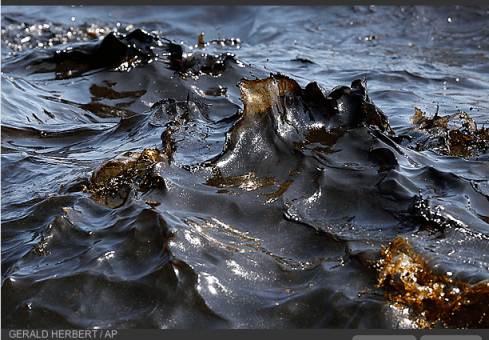Here’s where you can see a closeup of the glass cling that the gallery’s sign guy installed for me. I had taken a tiny-teeny piece of ocean wave clip art and turned it into a repeating tile. We used it on the gallery window and the upper outside edge of glass, wrapping its way around all the way down the stairs to the second set of galleries and to the conclusion of the journey in New Orleans. I loved the way the this graphic interacted with the gallery’s already existing white lettering signage on their windows and interior glass.
12
There were about a hundred of these little birds, perched on river stones. Even though they started life in a factory in China and then made their way to my studio factory, they each had their own distinct personalities.
13
In addition to the oil-slick sickness I gave the birds fluorescent blue feathers. My idea was that with enough toxicity, wildlife will surely mutate into a creature that we may not recognize as a bird in the traditional sense.
14
This text came directly from a report made by an average citizen to the U.S. Coast Guard. Amazingly, you can find them all, thousands of reports, in spreadsheets on a federal web site. The text was printed on transparencies, cut up in wavy curvy shapes and then coated in an epoxy, creating the appearance of a puddle.
15
Down the River ~ 4
July 12, 2015 — Carolyn P. SperanzaDown the River ~ 2
July 9, 2015 — Carolyn P. Speranza. . . And here’s the birds! that great you from the street. People do stop to look at them and read their sad story.
4As I made alot of these little guys – and big ones too, Mick and I started to call our house, the “bird factory.” It really was set up like a factory with buckets of feathers and birds laid out in certain order.
5
You can just begin to see the text, trapped in a liquid-appearing epoxy, that people would stop and read from the street outside the gallery.
6
“Down the River . . .” started in Pittsburgh at the head of the Ohio and took us down the Mississippi to New Orleans. Two narratives ran along these rivers. The one you see here is the reports people called into the U.S. Coast Guard in 2013 -14 of toxic dumping and spills along the Ohio and Mississippi Rivers.
7
“a chance for something worthwhile to rise out of the muck still bubbling up from the floor of the Gulf of Mexico”
March 6, 2012 — Carolyn P. Speranza . . . the moment is there for the taking, a chance for something worthwhile to rise out of the muck . . .
The Big Spill, TIME, May 17, 2010
Two years later . . . NPR: March 5, 2012
Deal Reached On Gulf Oil Spill Victims RENEE MONTAGNE and JEFF BRADY
MONTAGNE: And does this, then, settle all the claims against BP?
BRADY: No it doesn’t. This does represent the largest group of plaintiffs that were suing BP – something more than 100,000 people hurt by the spill. These are folks in the sea food industry, tourism workers, but not everyone. Gulf Coast states and the federal government still have claims against the company. The federal claims alone, based on laws like the Clean Water Act, could cost BP billions more dollars. And the amount depends on whether the government can prove the company was grossly negligent. That’s a technical term that would have to be proven in court.
—————————
Then there’s a New Health Claims Process to consider . . . for both Gulf residents and those hired to clean up the spill who have seen their and their children’s health affected by the spill and the clean-up. The NIH and the NIHS both have health studies on the affects of the spill, and it’s looking like these issues will be fought out in court for years to come(despite the settlement).
The politics are ruthless, the corporations are ruthless. Off-shore drilling continues to abound around the world. Regular people are caught in the middle – they need jobs to pay the bills and they need a clean environment for good health. In some cases their jobs and businesses are dependent on having a clean environment.
What leaves me curious is the approach of the Obama Administration. On the one hand, the administration is auctioning off an increasing number of opportunities to drill of our coasts as well as negotiating with Mexico to do so. (Mexico’s regulations and environmental protections are much less than our own) On the other, the U.S. Department of Defense is one of single-most biggest oil users in the world. You can read the Pew Charitable Trusts’ report outlining the DOD’s energy usage. In addition, 80% of supply convoys in Iraq and Afghanistan are for the transportation of fuels. In 2010 alone there have been 1,100 attacks on these convoys. And between 2003 and 2007, 3,000 soldiers died from these attacks just in Iraq. As a result, our military is shifting toward using clean energy to increase national security and to save money. An estimated 10 billion dollar investment by 2030 will reduce our dependence on foreign oil, create jobs and give the green energy sector a shot in the arm that it could really use. Somewhere in my reading, a journalist’s observation was that the administration was operating true to form: extremely pragmatic and predictably annoying to both sides of the issue. I get it.
References:
http://www.energyandcapital.com/articles/the-department-of-defense-goes-green/1797
http://news.cnet.com/8301-11128_3-20110134-54/military-green-investments-could-hit-$10b-by-2030/
Click to access DoD-Report_FINAL.pdf


















